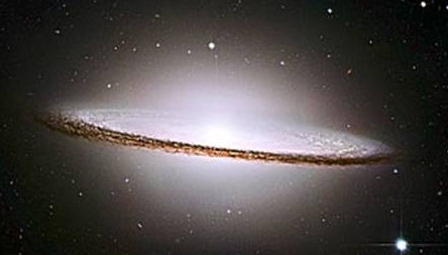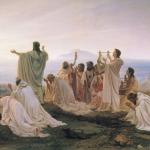
(Photo taken by the Hubble Space Telescope)
The name of the galaxy comes from the curious and, to scientists, very surprising fact that apparently all of its residents speak Spanish. (The pope gave Portugal absolutely nothing in this case.)
Notes from Hans Küng, The Beginning of All Things: Science and Religion, translated by John Bowden (Grand Rapids and Cambridge: William B. Eerdmans Publishing Company).
Commenting on the account in Genesis:
Light was created before all other things, even before sun, moon, and stars. Joseph Haydn in his oratorio The Creation expressed this more vividly than any words could, better even than Michelangelo could depict it in the Sistine Chapel: with the surprising fortissimo change in the whole orchestra from dark E minor into radiant triumphal C major, the biblical saying about light is, as it were, re-created in music. (xi)
Einstein argued for a “cosmic religious feeling” free of dogmas, which “knows no God devised in the image of human beings.”* In his view this cosmic religious feeling is “the strongest and noblest motive for scientific research.”** “What a deep conviction of the rationality of the universe and what a yearning to understand, were it but a feeble reflection of the mind revealed in this world, Kepler and Newton must have had to enable them to spend years of solitary labour in disentangling the principles of celestial mechanics! . . . Only one who has devoted his life to similar ends can have a vivid realization of what has inspired these men and given them the strength to remain true to their purpose in spite of countless failures. It is cosmic religious feeling that gives a man such strength.”*** (xii-xiii)
* Cf. A. Einstein, “Religion and Science,” New York Times Magazine, 9 Nov. 1930, reprinted in Ideas and Opinions (New York, 1954), 36-40, here 37.
** Einstein, “Religion and Science,” 38.
*** Einstein, “Religion and Science,” 38f.
I like this next passage and will probably cite it as self-justification in the eventual introduction to the volume that I myself envision:
Over recent decades research in cosmology, biology, and anthropology has progressed so far and become so extensive that it is almost impossible for those outside these disciplines to comprehend. That is often true even for scientists. One of the great figures of physics formulated the dilemma of a universal approach at a very early stage and saw “only one way out”: “that some of us venture to look at facts and theories together, even if their knowledge is in part only second hand and incomplete — and they run the risk of making themselves look ridiculous.” Erwin Schrödinger, the founder of wave mechanics and a Nobel Prize winner, the man who began to look at the living cell with the eyes of a physicist, wrote this in 1933 in his book What is Life? I hope the reader will graciously accept his excuse as mine. (xiii)











